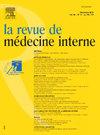JAK inhibitors (JAKi): Mechanisms of action and perspectives in systemic and autoimmune diseases
IF 0.7
4区 医学
Q3 MEDICINE, GENERAL & INTERNAL
引用次数: 0
Abstract
Janus kinase (JAK) molecules are involved in important cellular activation pathways. Over the past decade, many targeted therapies have emerged, including the increasingly promising role of JAK inhibitors (JAKi) in the treatment of inflammatory and autoimmune diseases. The spectrum of use of these small molecules is increasingly broader. JAKi have been approved in several autoimmune diseases. Currently, four molecules (tofacitinib, baricitinib, upadacitinib and filgotinib) have been labeled for moderate to severe rheumatoid arthritis (RA) with failure or poor tolerance of one or more conventional disease-modifying antirheumatic drug (csDMARDS), or biologics (bDMARDS). JAKi are now also commonly used in other diseases such as psoriatic arthritis, ankylosing spondylitis, and ulcerative colitis. They have also shown promising results in clinical trials for the treatment of other autoimmune conditions. We present here their mechanisms of action, and the main data about JAKi use on systemic and autoimmune diseases.
JAK抑制剂(JAKi):系统性和自身免疫性疾病的作用机制和前景。
Janus 激酶(JAK)分子参与了重要的细胞活化途径。在过去十年中,出现了许多靶向疗法,其中包括在治疗炎症和自身免疫性疾病方面前景日益看好的JAK抑制剂(JAKi)。这些小分子药物的使用范围越来越广。JAKi已被批准用于治疗多种自身免疫性疾病。目前,有四种分子(托法替尼、巴利替尼、乌达替尼和非格替尼)已被标记用于治疗一种或多种传统改变病情抗风湿药(csDMARDS)或生物制剂(bDMARDS)治疗失败或耐受性差的中度至重度类风湿性关节炎(RA)。目前,JAKi 也常用于银屑病关节炎、强直性脊柱炎和溃疡性结肠炎等其他疾病。它们在治疗其他自身免疫性疾病的临床试验中也显示出良好的效果。我们在此介绍它们的作用机制,以及有关 JAKi 用于系统性和自身免疫性疾病的主要数据。
本文章由计算机程序翻译,如有差异,请以英文原文为准。
求助全文
约1分钟内获得全文
求助全文
来源期刊

Revue De Medecine Interne
医学-医学:内科
CiteScore
0.70
自引率
11.10%
发文量
526
审稿时长
37 days
期刊介绍:
Official journal of the SNFMI, La revue de medecine interne is indexed in the most prestigious databases. It is the most efficient French language journal available for internal medicine specialists who want to expand their knowledge and skills beyond their own discipline. It is also the main French language international medium for French research works. The journal publishes each month editorials, original articles, review articles, short communications, etc. These articles address the fundamental and innumerable facets of internal medicine, spanning all medical specialties. Manuscripts may be submitted in French or in English.
La revue de medecine interne also includes additional issues publishing the proceedings of the two annual French meetings of internal medicine (June and December), as well as thematic issues.
 求助内容:
求助内容: 应助结果提醒方式:
应助结果提醒方式:


